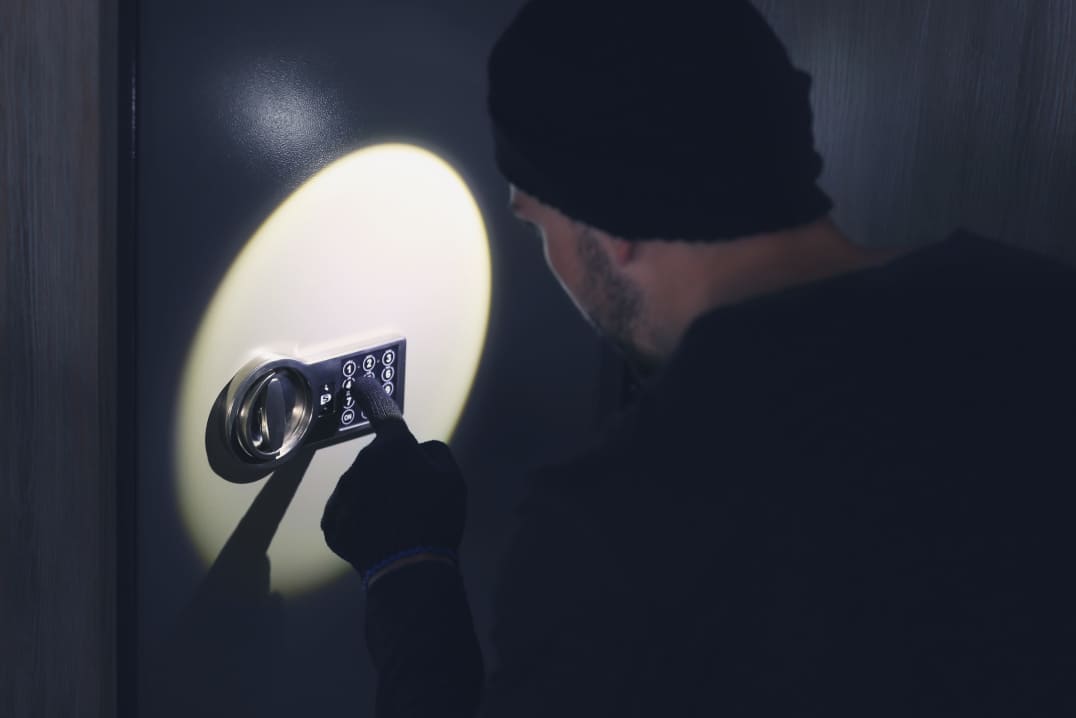Avoid attempted precious-metal fraud
Additional information > Prevailing conditions for value storage in Switzerland and Liechtenstein > Avoiding scams and potential precious-metal fraud
Internet scams: What steps can investors take to protect themselves?
Nowadays, it is commonplace for most of us to use the Internet to gather information and seek the best deals. The same applies to investors in the precious metals sector, yet it can often be quite difficult to distinguish genuine service providers from fake offers. Alongside reputable businesses, there are many online scammers seeking to make money from trusting consumers via false websites, phishing e-mails and fake identities. Some are successful, deploying bold scams which can look very professional. Yet savvy investors who protect themselves can avoid losing their valuable assets.

photoschmidt 2021 © - stock.adobe.com
It’s becoming increasingly common for such fraud attempts to use the names of well-known companies, and even clone their corporate identities. In the summer of 2023, private individuals began to receive telephone calls, supposedly from the Federal Office of Customs and Border Security (BAZG) and from Swiss Border Control. A recorded announcement informed those affected that a package had been confiscated, and asked them to immediately contact the relevant customs office. In reality, these were fraudulent calls and Swiss customs advice to anyone contacted in this way is to terminate the call immediately. You can find out more about this issue on the official BAZG website. However, under no circumstances should you provide personal data or account information, and you should never grant anyone remote access to your computer.
In another series of scams, callers posing as police officers targeted people of retirement age. They warned seniors about the risk of unauthorised account withdrawals and advised them to convert their savings into gold, and then withdraw them as quickly as possible. The obvious intention here was to subsequently rob the unfortunate savers. According to those affected, the eloquent callers were remarkably convincing and some orders for account conversions were actually submitted to banks. Luckily, many victims recognised the scam, but others were pressured into handing over cash or valuables.
Buyers of unusual gift ideas can also become unwitting victims of deception. For instance, gold-plated real roses were offered via an Internet platform. While these can clearly be offered quite legitimately, in this case the product was advertised together with a fake certificate of authenticity from a Swiss warehouse operator. However, the company involved had never issued these particular certificates.
Cybercrime is on the increase and can take many forms
One of the best-known Internet scams concerns receiving information about a large amount of money, often to be sent via e-mail. This notification is almost always accompanied by a note advising that a ‘processing fee’ is due before the monies can be released. In other cases, online dating sites are used to target potential victims using false identities and fake photos. A trustful relationship is built up over a longer period of time via telephone or Internet chat rooms before the first demands for money are made.
Fake websites which look similar to your bank’s corporate web presence also pose a great danger. These fake portals often appear when you attempt to access your bank via links appearing in search engine listings. Unsuspecting users may fail to notice that the displayed Internet address is quite different. On such fake pages, users are then asked to enter their account details and passwords. Phishing e-mails, which also look as if they come from a bank or an online shop, work by employing much the same pattern. Here too, users are asked to enter their login data, which then allows fraudsters to gain access to your bank account, for example. Businesses can also be affected by ransomware – malicious programs that can lock and encrypt computer data. The perpetrators then blackmail their victims with high ransom demands for the release of vital company information.

2B © - stock.adobe.com
These are just a few examples of common online scams. Crime prevention officers are aware of many other tricks that fraudsters use to try to gain the trust of gullible people. The Swiss Crime Prevention website deals with this topic in detail. One relatively new scam involves online investment fraud. This relies on the fact that many savers wish to employ investment transactions to secure their assets or improve their pension fund. Cyber criminals thus use telephone calls, spam e-mails and false investment platforms to attract customers to their suspect products, such as trading cryptocurrencies. These fraudsters often display a high level of professional expertise. And with fake receipts and the promise of lucrative profits, victims are sometimes tricked into investing money they will never see again.
Precious metal fraud
Attempts at fraud involving precious metals occur over and over again. For example, import support for capital goods such as silver bullion bars or platinum coins to be transferred to Switzerland at reasonable prices, can be offered online or via e-mail. Customers then incur high transport and customs fees, as well as additional costs for interim storage – all of which must be paid in advance. However, no actual transport ever materialises and the supposed precious metals simply disappear.
There are also known cases of fraud involving precious metals offered via fake online shops. This type of crime clearly exploits investors seeking protection against inflationary pressures or looking to diversify their assets. These online shops can seem very realistic: Investors can select gold bars or silver coins from online catalogues before adding them to the shopping cart. A range of payment methods are often available, and to reassure unwary buyers, fraudsters even issue fake order and shipping confirmations via e-mail. However, any gold ordered never arrives and the money transferred is lost forever.
But fraudulent offers in the precious metals sector are not just limited to fake online shops. The Internet also hosts phoney offers of storage for gold and silver products. Fraudsters rely on the fact that investors do not wish to store their precious metal holdings themselves, or in a bank safe deposit box. These would-be custody service providers act as intermediaries prepared to manage the gold on behalf of the customer. In addition to the actual storage, such offers can also include the delivery or sale of precious metals. In reality, these investment products are never stored, but sold immediately after delivery by the customer. Unsurprisingly, the service provider then proves absolutely impossible to contact.
How to distinguish reputable precious metal providers from fake offers
Consumers and investors CAN protect themselves against precious metal scams! Dubious Internet offers, for example, can be exposed relatively quickly. It helps to take a careful look at the imprint or contact page of any doubtful online presence. If there is no verifiable postal address given, but only a contact form or a general e-mail address instead, it is advisable to be extremely cautious. Other indicators of potential fake shops include prices that are unrealistically low, advance payment options only, lack of additional information about the company online, plus fake reviews and counterfeit trust seals. Conversely, anyone who acts reputably will always provide their contact details in a transparent and verifiable manner, and further information will be available via online search engine resources. It is reassuring to remember there are authentic online shops and service providers happy to offer the purchase and sale of precious metals as well as secure storage at home and abroad, including duty-free storage.
Precious metal fraudsters and their scam tactics
In order to win over their potential victims, fraudsters tend to rely upon several set behavioural patterns they have found to be effective. Experts repeatedly observe similar procedures, all primarily based on gaining trust and then exploiting it. False identities are the norm and plausible frontmen are used to maintain contact. Here are three classic examples of such techniques:
The false prince
In large-scale fraud involving precious metals, the perpetrators build a relationship of trust with their victims. This has sometimes been developed over a period of years. To avoid revealing themselves in person, the culprits hire well-trained actors to appear at meetings and represent them during video calls. Once a trustful relationship has been established, the next step is to promise expensive precious metal gifts. In order to receive these bonuses, the “recipient” must first pay a range of import fees, transport costs, and perhaps the cost of customs formalities, all of which are collected in advance. But there are no precious metals. The criminals are only interested in extracting the initial costs. And after that, they pocket the money and can never be contacted again.
The business partner
Another common scam involves seeking business partners to import large quantities of precious metals into Switzerland, all available to purchase at very low prices. The partners duped into signing up to such schemes are promised a large share in gold investments or a handsome commission. Naturally, all such gold purchases must be pre-financed. Furthermore, the tricksters also create fictitious transport costs and import fees, which the unsuspecting partner is again required to pay up front. Once all monies are collected and forged receipts issued, the scam is complete, the swindlers vanish, and the unfortunate victim is then left with a damaging loss.
The borrower
One more well-known scam occurs when conmen manage to extract loan funding from their victims. Wealthy individuals are often induced to grant loans as an alternative investment opportunity, with arrangements sometimes involving large sums of money. In exchange, fake warehouse receipts from well-known companies that store precious metals for their clients are submitted as loan security. The loan amount is thus handed over in good faith but never repaid. And in addition, the good reputation of the storage provider is abused in order to lull the unsuspecting lender into a false sense of security.

africa-studio.com (Olga Yastremska and Leonid Yastremskiy) © - stock.adobe.com
Common features: How to recognise fraud
All common scams have certain similarities which make them easy to recognise. Here is a summary of the most important elements:
- Quite soon after a trusting relationship has been established, the victim is asked for an advance payment or something else in return. This may not be just a single payment; further demands are often made.
- Scams are designed to prey on the victim’s sympathetic attitude, or their distress and/or desire for profit are ruthlessly exploited.
- Perpetrators are intimately familiar with human nature and deliberately exploit weaknesses. Greed and profit-seeking are characteristics that are often much stronger than any tendency to ask questions and proceed with caution. This holds true for all levels of society. So, even very cautious, intelligent people can become fraud victims if they are lured with promises of prizes or expensive gifts.
- There is a noticeable and growing trend towards professional-looking scams. Thanks to automatic translation software and artificial intelligence, perpetrators' offers are better-written and better-presented. In addition, realistic scenarios are created, such as a letter from a Nigerian prince, who has a lot of gold and wants to share his wealth.
- Victims are increasingly subjected to subtle pressures which then escalate. At first, these are hardly noticeable, but influences are gradually brought to bear on specific individual weaknesses until the goal is achieved.
Measures to protect against online fraud
The good news is you can protect yourself from online, telephone and e-mail scams. Experts recommend the following measures to protect yourself against common scams and fraud:
- Don’t respond to e-mail enquiries from people you don’t know personally, and those who contact you via social networks (Facebook, LinkedIn, Xing). You should delete these messages as a precaution.
- You should particularly ignore notifications of an inheritance, gift or unclaimed lottery winnings you ‘only need to claim’. Treat all such messages as fraudulent – and don’t investigate further. You can delete these types of contact without reply.
- Check the sender's e-mail address. Does this correspond to the address displayed in the sender field? This will often reveal unusual, cryptic names.
- Never click on e-mail links unless the messages are from people you know. Do not visit suspicious websites.
- Don’t share your personal information. Apart from bank details, this also includes data such as your address, telephone number, date of birth, etc.
- Check questionable online statements via your own search queries and, if in doubt, contact senders by alternative routes, for example using the contact details published on official homepages.
- There is also the further option of asking a neutral third party (notary, lawyer, police) to check suspect approaches. The police and criminal authorities can offer you independent support. Especially if you fear you are, or have been, a victim of fraud. The police will provide information and support, and treat your request in confidence.
- Be extremely cautious if you are offered raw gold or doré bars direct from mines. Such intermediate products cannot be imported into Switzerland by private individuals – to do so would constitute a criminal offence. Furthermore, Swiss precious metal refineries will not process precious metals unless they can verify these originate from an authenticated source. This would also violate protocols demanded by the authorities and relevant trade organisations.
How Swiss Gold Safe avoids fraud
Swiss Gold Safe Ltd is a provider of highly secure storage solutions for precious metals and other physical valuables in Switzerland and the Principality of Liechtenstein. We have been serving our clients with the utmost discretion for more than a decade. We avoid fraud by using thoroughly tried-and-tested procedures designed to protect our company and clients.
We never make unsolicited contact with anyone, and will never pass on any data about current or former clients. If you are presented with documents that claim to have been created by us in connection with any business or private transaction, you are welcome to send the documents to us for review. If these are counterfeit, we will inform you and initiate the appropriate procedures. If the documents are genuine, we will inform the client about the submission we received and will make no further comment. Learn more about our procedures in the following summary:
- At Swiss Gold Safe, we do not buy or sell precious metals. We are professional storage providers.
- We do not certify precious metal holdings nor precious metal products.
- We do not offer tradeable warehouse receipts – not even those which promise the delivery of physical precious metals.
- Swiss Gold Safe does not transport precious metals, and the same also applies to the import of precious metals into Switzerland. Upon request, we can support existing or potential clients in organising precious metal transport via certified partner companies.
- We never proactively contact people who are not known to us.
- We do not mention the names of potential, current or former clients. The same applies to clients who have passed away, or those now described as missing persons.
- We do not charge processing fees for services not specifically requested by our clients.
- We do not charge processing fees for services to third parties with whom we have no existing business relationship.
- We do not hold goods belonging to third party clients.
- Our safe deposit boxes cannot be rented in the name of third parties unknown to us.
- We do not keep keys to the safe deposit boxes hired by existing clients. The same applies to safe deposit box keys for the use of designated third parties.
- We send and answer e-mails exclusively via our domain extensions @swissgoldsafe.ch or @swissgoldsafe.li. Thus, any other combination of Swiss Gold Safe or other domains will not have come from us.
- We act and operate exclusively as “Swiss Gold Safe”. Any other combination, or use of similar terms, has nothing to do with our company.
- We operate exclusively in Switzerland and Liechtenstein and do not have branches in other countries.
We would be happy to answer any further questions you may have about fraud prevention, or our products and offers, via our Swiss Gold Safe Ltd contact page.
Attempted precious-metal fraud at a glance
- Online fraudulent behaviour has increased in recent years. This is also the case in the precious metal sector.
- The corporate identity of well-known companies is often misused in order to gain the trust of potential victims.
- Examples range from fake import support for silver and gold investments to phoney online shops and bogus custody services.
- Experts warn against the scams employed by precious-metal fraudsters, who almost always try to win the trust of their victims before exploiting them.
- These scams exhibit common behaviours which can help to expose deceptions.
- Investors and consumers can take some relatively simple steps to protect themselves against these dangerous fraud attempts.
- As a provider of professional storage solutions for physical goods, Swiss Gold Safe adopts a tried-and-tested approach to protect clients and avoid the consequences of fraudulent behaviour.

